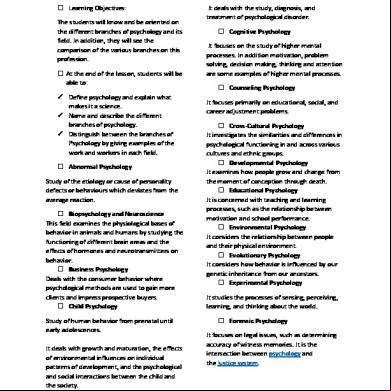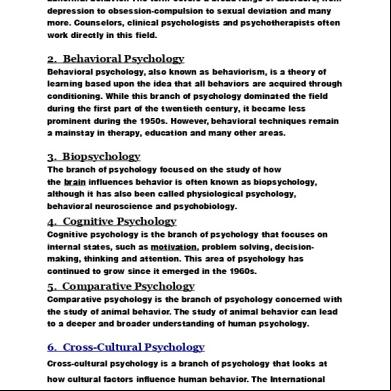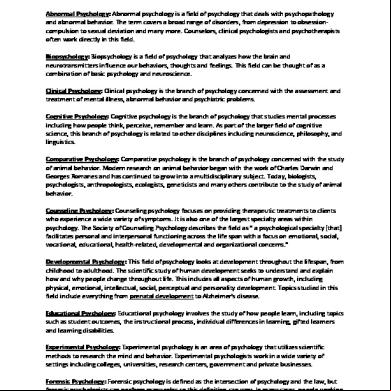Branches Of Psychology And Its Related Fields 4b3s6z
This document was ed by and they confirmed that they have the permission to share it. If you are author or own the copyright of this book, please report to us by using this report form. Report 3b7i
Overview 3e4r5l
& View Branches Of Psychology And Its Related Fields as PDF for free.
More details w3441
- Words: 563
- Pages: 2
Branches of Psychology and Its Related Fields Learning Objectives: The students will know and be oriented on the different branches of psychology and its field. In addition, they will see the comparison of the various branches on this profession. At the end of the lesson, students will be able to: Define psychology and explain what makes it a science. Name and describe the different branches of psychology. Distinguish between the branches of Psychology by giving examples of the work and workers in each field. Abnormal Psychology Study of the etiology or cause of personality defects or behaviours which deviates from the average reaction. Biopsychology and Neuroscience This field examines the physiological bases of behavior in animals and humans by studying the functioning of different brain areas and the effects of hormones and neurotransmitters on behavior. Business Psychology Deals with the consumer behavior where psychological methods are used to gain more clients and impress prospective buyers. Child Psychology Study of human behavior from prenatal until early adolescences. It deals with growth and maturation, the effects of environmental influences on individual patterns of development, and the psychological and social interactions between the child and the society.
Clinical Psychology It deals with the study, diagnosis, and treatment of psychological disorder. Cognitive Psychology It focuses on the study of higher mental processes. In addition motivation, problem solving, decision making, thinking and attention are some examples of higher mental processes. Counseling Psychology It focuses primarily on educational, social, and career adjustment problems. Cross-Cultural Psychology It investigates the similarities and differences in psychological functioning in and across various cultures and ethnic groups. Developmental Psychology It examines how people grow and change from the moment of conception through death. Educational Psychology It is concerned with teaching and learning processes, such as the relationship between motivation and school performance. Environmental Psychology It considers the relationship between people and their physical environment. Evolutionary Psychology It considers how behavior is influenced by our genetic inheritance from our ancestors. Experimental Psychology It studies the processes of sensing, perceiving, learning, and thinking about the world. Forensic Psychology It focuses on legal issues, such as determining accuracy of witness memories. It is the intersection between psychology and the justice system.
Health Psychology It explores the relationship between psychological factors and physical ailments or disease. Health psychologists are concerned with understanding how biology, behavior, and the social situation influence health and illness. Industrial/Organizational Psychology It is concerned with the psychology of the workplace. Personality Psychology It focuses on the consistency in people’s behavior over time and the traits that differentiate one person from another. Physiological Psychology The study of the functions of the different organs of the body, especially the nervous system, and their bearing on behavior and mental processes. Psychology of Women It focuses on issues such as discrimination against women and the cause of violence against women. School Psychology It is devoted to counseling children in elementary and secondary schools who have academic or emotional problems. Social Psychology Study of how people’s thoughts, feelings and actions are affected by others and it explains and understands social behavior, includes group behavior, social interaction, and social influences on decision making. Sport Psychology It applies psychology to athletic activity and exercise
Clinical Psychology It deals with the study, diagnosis, and treatment of psychological disorder. Cognitive Psychology It focuses on the study of higher mental processes. In addition motivation, problem solving, decision making, thinking and attention are some examples of higher mental processes. Counseling Psychology It focuses primarily on educational, social, and career adjustment problems. Cross-Cultural Psychology It investigates the similarities and differences in psychological functioning in and across various cultures and ethnic groups. Developmental Psychology It examines how people grow and change from the moment of conception through death. Educational Psychology It is concerned with teaching and learning processes, such as the relationship between motivation and school performance. Environmental Psychology It considers the relationship between people and their physical environment. Evolutionary Psychology It considers how behavior is influenced by our genetic inheritance from our ancestors. Experimental Psychology It studies the processes of sensing, perceiving, learning, and thinking about the world. Forensic Psychology It focuses on legal issues, such as determining accuracy of witness memories. It is the intersection between psychology and the justice system.
Health Psychology It explores the relationship between psychological factors and physical ailments or disease. Health psychologists are concerned with understanding how biology, behavior, and the social situation influence health and illness. Industrial/Organizational Psychology It is concerned with the psychology of the workplace. Personality Psychology It focuses on the consistency in people’s behavior over time and the traits that differentiate one person from another. Physiological Psychology The study of the functions of the different organs of the body, especially the nervous system, and their bearing on behavior and mental processes. Psychology of Women It focuses on issues such as discrimination against women and the cause of violence against women. School Psychology It is devoted to counseling children in elementary and secondary schools who have academic or emotional problems. Social Psychology Study of how people’s thoughts, feelings and actions are affected by others and it explains and understands social behavior, includes group behavior, social interaction, and social influences on decision making. Sport Psychology It applies psychology to athletic activity and exercise










